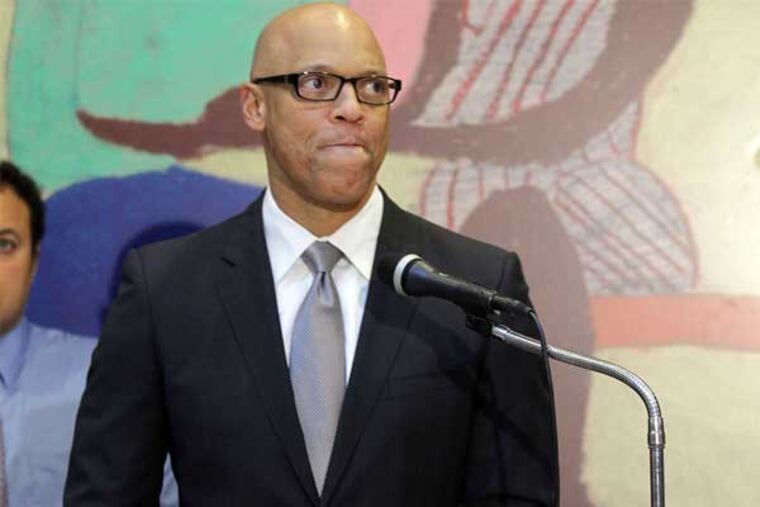District recruits corps to lead way to reorganization
Today a third-grade teacher in a Philadelphia School District classroom, next month a teacher-training specialist with direct access to Superintendent William R. Hite Jr.?

Today a third-grade teacher in a Philadelphia School District classroom, next month a teacher-training specialist with direct access to Superintendent William R. Hite Jr.?
District officials hope so.
They are recruiting a small group of people at every level of the organization, from teachers on up, to be part of a unique "Transformation Corps" - 15 or so employees who will work to solve the school system's most critical problems.
The members of the corps will answer to folks at the top reaches of the district and work with high-level mentors - successful superintendents and experts from around the country.
"The people that we're looking for are smart, passionate, really good problem-solvers, really good at getting things done," Deputy Superintendent Paul Kihn said. "This organization is full of people like that. It's a pretty simple idea, but we're very excited by it."
The first round of applications is due Friday, with another round due Jan. 11. The first wave would start their new jobs as part of the corps sometime in January.
When Hite and Kihn arrived in Philadelphia in the fall, it became quickly apparent on visits to schools and to various central office departments that they have major challenges, Kihn said.
Namely, multiple pressing issues need tackling, but the district lacks the internal capacity to handle them. In the last several years, the organization has been hit hard by layoffs, departures, budget cuts, and turmoil.
"In a lot of cases, people are just exhausted," Kihn said. "But there are a bunch of really good people, and many of them feel they don't have good professional advancement opportunities."
Corps members will be embedded in a specific area of the district, but have access to top leadership. They will also meet weekly as a group for seminars, and be mentored by a group of outside officials now being gathered.
Kihn said he could not disclose names since no agreements were in place, but the volunteer mentors would likely include successful urban superintendents, CEOs of organizations that successfully transformed themselves, and perhaps mayors of cities that handled major quality-of-life issues.
Kihn said the corps would be "cost-neutral," that the employees selected for it would be replaced with existing employees already within the organization, like long-term substitutes or educators now on special assignment in the case of teachers selected for the corps.
Applicants are welcome from all experience levels, Kihn said, but two years' professional experience and a college degree are required. Assignments will be made on skills and interests, and could be in areas like "five-year recovery efforts, financial accountability, academic excellence, operational support systems, and building a system of great Philadelphia schools," according to district documents.
In early January, Hite will release his "action plan" - priorities for a district in trouble, academically and financially. The tasks that corps members will work on will directly correlate to those priorities.
Two specific examples, Kihn said, are teacher training and charter school supervision.
Currently, the district's charter school office has a just a handful of employees supervising 80 charters; corps members could help figure out "how we can be a better authorizer" of charters, Kihn said. And for teacher training, research shows that the best professional development happens inside classrooms and when teachers collaborate.
"We've got different abilities among coaches and administrators in buildings to know how to do that," Kihn said. "So, OK, what do we do about teacher professional development? That's a great example of something we'd love to have a teacher working on."
A further cohort of 10 to 15 people recruited from all over the country could supplement the internal corps, Kihn said. Those employees would only be hired if philanthropic support was secured, he said.
"But we are being very careful to ensure that district work is being led by district people," Kihn said.
And any external corps members would be district employees, and the organizations or individuals funding them would have no influence over who got hired or the projects they worked on.
Kihn said he knew of no other such programs in other school districts.
Though district employees were just notified of the corps on Wednesday, by Thursday, Kihn said, some applications had already been received.
"It feels like this is the kind of thing that people may be interested in," he said.
If the program proves successful, it could be expanded past the first year.